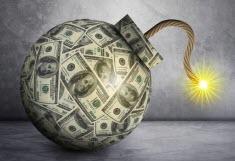Colonel Muammar Qaddafi, who wanted to dethrone the dollar, paid for it with his own life.
Iraq’s President Saddam Hussein, who wanted to make settlements in a currency other than the US dollar, was hanged.
Now it is Russia and China, which want to do the same.
Just days ago an agreement was signed to this effect.
(i) Russia and China have decided to begin to make mutual settlements increasingly in their respective national currencies, and
(ii) they have decided to bypass the SWIFT system, introducing their own instead.
Moscow has also revealed lately that Russia has stopped using the US dollar and the SWIFT system for settlements in arms trade.
The exchange of goods between Russia and China is significant; Russian weaponry has a lot of clients around the globe. On the other hand both countries, and especially China, have large dollar reserves. And both states are under attack from the West, be it economic sanctions against Moscow, be it American trade war against Beijing.
To administer punishment for such a daring act was child’s play in the case of Libya and Iraq: the two countries were swiftly dealt with. What can one do with a nuclear superpower on the other hand and Asia’s largest economic tiger on the other?
If Washington has wanted to weaponize Moscow against Beijing or the other way round as it seems it has, then the strategists on the Potomac must swallow a bitter pill. The hybrid war waged against Russia in Georgia, Ukraine, Moscow, the Baltic States, Poland as well as in Venezuela and Syria rather than weakening the target state have cemented its embrace with the Middle Kingdom. The same effect was brought about by America’s trade war against and other unfriendly acts aimed at Beijing. Rather than subdue the two states, Western politicians pushed them into each other’s arms.
The financial world is witnessing the beginning of dedollarization. We had better become used to this term. Over seventy years after the initiation of the Bretton Woods international financial system that enthroned the dollar as a currency of international settlement (1944), and over forty years after the Jamaica Accords, which modified the former (1976), over twenty years after the fall of the Soviet Union, the prime opponent of the United States, when it seems that history has run the full circle and has nowhere else to go, with humanity being about to enter a politically uni-polar world, the gauntlet has been thrown down by the ruble and the yuan to challenge the position of the greenback and the powers behind it. Will the three remaining BRICS countries (Brazil, South Africa and India) follow suit?
Admittedly, the US and EU economies have no rivals, but empires and superpowers have one characteristic: they can fall and disintegrate within months. World War One brought the total collapse of the German, Hapsburg, Russian and Ottoman Empires; the Cold War – the disintegration of the Soviet Union. Those events happened unexpectedly and swiftly.
Having the international currency in its hands, the United States has been doing all kinds of financial tricks, of which printing money out of thin air is just the best known example. Washington could keep other economies in constant dependence by limiting the availability or value of the dollar and also – as economists call it – by importing American inflation. Stripped of this tool, the US will be deprived of one of the powerful weapons in exacting obedience from foreign sovereigns.
Western economists comfort themselves with the idea that the plan forged by Moscow and Beijing is far from coming to fruition and hampered by so many objective factors that its success is most unlikely. Well, after the Second World War Americans were certain that the Soviet Union – due to the backwardness of its economy and the havoc wreaked by the hostilities – would only have its own A-Bomb in twenty or so years. It had within four, soon to be followed by the launching of the first satellite and putting the first man on the earth’s orbit.
Making settlements in national currencies, both Russia and China will gain more financial leeway. This kind of settlements can gradually be spread to the dealings with other countries. No doubt, Russian weapons, which are of high quality and desired by many countries, once they are sold in exchange for the ruble, will pave the way for turning Russia’s money from a convertible into an international currency.
China will be less dependent on the dollar. It will stop accumulating empty money and gain leverage in its dealings with the United States. The bargain chip? The volume of trade in the ruble/yuan. The less friendly attitude on the part of Washington, the larger the volume and vice versa.
via ZeroHedge News https://ift.tt/2JzYJN9 Tyler Durden
